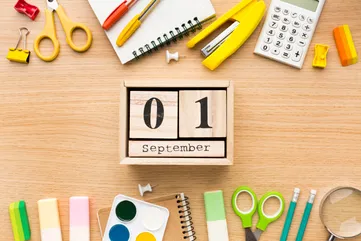Task Initiation
Task initiation is the executive function skill that helps your teen start tasks without endless procrastination, even when their brain would rather do literally anything else.
Why task initiation can be a problem
Task initiation difficulties go beyond normal procrastination. Your teen might desperately want to start homework but feel physically unable to begin, like an invisible wall stands between them and the task.
Common signs:
• Spending hours "getting ready" to start homework
• Needing multiple reminders to begin simple tasks
• Doing everything except the important task
• Paralysis when facing big projects
• Starting tasks only when they become emergencies
• Requiring a "personal invitation" to begin work
This creates academic crises, family conflict, and crushing anxiety. Your teen isn't lazy or defiant. Their brain struggles to generate the activation energy needed to begin, especially for tasks that aren't immediately rewarding.
You're not alone
Task initiation challenges affect most teens with ADHD and many with anxiety or learning differences. If you've become your teen's personal task manager, constantly prompting them to start things they know they need to do, you're not alone. Many parents describe feeling like a broken record, repeating "have you started your homework?" dozens of times. The frustration is real on both sides. Your teen likely feels terrible about their inability to just begin, while you wonder why simple tasks require so much effort. Understanding task initiation as a neurological challenge rather than a character flaw changes everything.
What it looks like day to day
Student
Your teen sits at their desk for an hour with homework out, reorganizing supplies, checking their phone, and sharpening pencils, but never actually starting the assignment.
Parent
You ask your teen to clean their room, and three hours later they've reorganized their bookshelf and sorted their pen collection but haven't touched the actual mess.
Tiny steps to try
Lower the activation energy required to start. Make beginning so easy that procrastination takes more effort than starting.
- 1
The two-minute start
Commit to just two minutes of work. Set a timer. Often, starting is the only hard part, and momentum carries them forward. Permission to stop after two minutes paradoxically makes continuing easier.
- 2
Body doubling
Work alongside your teen without helping. Your presence provides accountability and models task engagement. Many teens can start when someone else is working nearby.
- 3
Shrink the task
Instead of "write your essay," try "open document and write your name." Make the first step laughably small. Success builds momentum for the next tiny step.
- 4
Environmental activation
Change locations, play specific music, or use a ritual to signal work time. External cues can trigger task initiation when internal motivation fails.
- 5
Backwards planning
Start with the deadline and work backwards, scheduling specific start times. External time pressure can provide the activation energy that internal motivation cannot.
Why task initiation matters
Task initiation relies on the prefrontal cortex generating enough activation to overcome the brain's natural inertia. For teens with ADHD or executive function challenges, this activation energy requirement is much higher, especially for tasks lacking immediate rewards.
Research shows that task initiation difficulties often stem from dopamine dysregulation rather than laziness or defiance. The ADHD brain requires higher levels of stimulation to activate the same neural pathways that neurotypical brains engage easily. This explains why teens can instantly start preferred activities but freeze before homework. Understanding this neurological basis helps parents respond with support rather than frustration.
Ready to help your teen thrive?
Get personalized 1-on-1 coaching to build better habits and boost grades. Join 10,000+ families who trust Coachbit.
Frequently Asked Questions
Is this procrastination or something more?
Task initiation difficulties go beyond typical procrastination. Procrastination involves choosing to delay, while task paralysis feels like being physically unable to start despite wanting to. If your teen experiences genuine distress about not starting, spends hours trying to begin, or only starts when panic sets in, this suggests executive dysfunction rather than simple procrastination.
Why can they start video games instantly but not homework?
This seems contradictory but makes perfect neurological sense. Video games provide immediate dopamine rewards that activate the brain's motivation system. Homework offers delayed, abstract rewards that don't generate enough activation energy for the ADHD brain. It's not about importance or choice; it's about how different tasks trigger different neurological responses. Preferred activities naturally provide the stimulation needed for task initiation.
Related Terms
ADHD Paralysis
ADHD paralysis is the overwhelming inability to start or complete tasks despite desperately wanting to, caused by executive function overload.
Body Doubling
Body doubling is working alongside another person whose presence helps maintain focus and motivation, particularly helpful for those with ADHD.
Executive Function
Executive function is your brain's management system that helps teens plan, focus, remember instructions, and juggle multiple tasks successfully.
Procrastination
Procrastination is delaying tasks despite knowing there will be negative consequences, often driven by emotional avoidance rather than poor time management.
Time Management
Time management is the ability to plan, prioritize, and use time effectively to accomplish tasks and meet deadlines without constant crisis.
Related Articles

3 Tips to Help Your Child Focus on Homework
Kids struggle to focus and are easily distracted because their brains are undergoing rapid development. There are effective tools to improve concentration and focus in kids.
Read article
Finding Order in the Chaos – Setting up Calendars for Kids
Creating a calendar and daily schedule for kids can be beneficial to manage school, homework, extracurriculars and hobbies. Color-coding and time-blocking are helpful tools for kids with ADHD.
Read article
